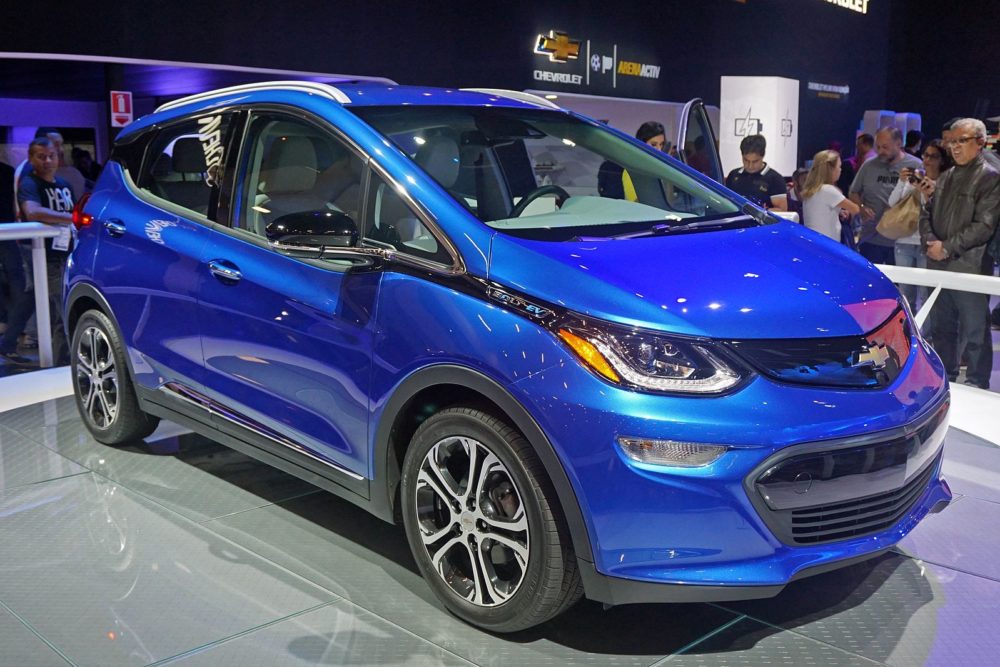The UK’s motor industry's trade association has urged Britain and the EU to “re-engage with vigour in the Brexit negotiation process"

General Motors claims its focus will be on offering zero-emissions vehicles across a range of price points (Credit: Wikimedia Commons/Mariordo)
Electric car prices in the UK could increase by almost £3,000 if a “no-deal” Brexit takes place.
That is according to a study by the Society of Motor Manufacturers and Traders (SMMT), which has urged Britain and the EU to “re-engage with vigour in the Brexit negotiation process, honouring the commitment to get a good deal done”.
The research by the UK’s motor industry’s trade association illustrates the “high stakes” of a no-deal scenario, not only for the automotive sector but for the “hopes of a green recovery from the coronavirus crisis”.
SMMT urges fresh talks to prevent no-deal Brexit and hike in UK electric car prices
The SMMT claims failure to strike a new deal would lead to an immediate imposition of blanket tariffs under World Trade Organisation (WTO) rules, which would lift the average price on EU-built EVs by £2,800 and effectively cancel out the UK’s £3,000 plug-in car grant.
The SMMT’s CEO Mike Hawes said: “Just as the automotive industry is accelerating the introduction of the latest electrified vehicles, it faces the double whammy of a coronavirus second wave and the possibility of leaving the EU without a deal.
“As the figures show, no-deal tariffs will put the brakes on the UK’s green recovery, hampering progress towards net zero and threatening the future of the UK industry.
“To secure a truly sustainable future, we need our government to underpin industry’s investment in electric vehicle technology by pursuing an ambitious trade deal that is free from tariffs, recognises the importance of batteries in future vehicle production and ensures consumers have choice in accessing the latest zero-emission models.
“We urge all parties to re-engage in talks and reach agreement without delay.”
New tariffs could “hold back” the evolution of the electric car
Alongside the £2,800 price increase for electric cars fitted with expensive battery technology, the SMMT said the 10% no-deal WTO tariff would add at least £4.5bn to the annual cost of fully assembled cars traded between the UK and the EU, with an average hike of £1,900 per EU-built vehicle sold in the UK.
It added that this tariff would also add some £2,000 on to the average cost of UK-built battery-electric cars (BEV) exported to the EU, making Britain’s products “less competitive” and the country “far less attractive as a manufacturing investment destination”.

This would further hamper the UK’s ambition to be a global leader in zero-emission vehicle development, production and deployment, severely damaging industrial competitiveness, claims the trade association.
It said the UK and EU automotive industries are “deeply integrated”, with about two thirds of all battery-electric cars on sale in Britain built in European factories.
The SMMT claims new tariffs would “hold back” the evolution of the electric car from a “niche technology to one with mass affordability”.
UK car buyers are currently on track to register as much as 78,000 BEVs this year, with further growth expected in 2021.
But the trade association estimates that the “price shock” caused by the tariff increases could reduce the increased demand for BEVs next year by at least 20%, even before the impact of potential border delays, supply chain disruption and currency fluctuations are taken into account, hindering efforts to “accelerate uptake and decarbonisation”.
UK lagging behind many of Europe’s major electric vehicle markets for incentives
As the UK government prepares to announce its timeline for transition to a fully-zero emission new car market, the SMMT believes the situation throws into even sharper focus the need for a “world-beating package of fiscal measures”, alongside “massive investment in charging infrastructure”.
It said the UK is lagging behind many of Europe’s major electric vehicle markets when it comes to market incentives.
The industry groups points to car buyers in Germany as an example, where they receive a purchase incentive of up to £8,160 per BEV, while French consumers can obtain a £6,350 grant – compared to the £3,000 subsidy in the UK.
It added: “To deliver the ambitious environmental goals – to which electric vehicles will make a significant contribution – there must be a long-term commitment to competitive incentives, including full VAT exemption for all zero-emission capable cars.
“This would potentially drive some 1.4 million BEV sales over the next five years, with an estimated 16% market share by 2025 compared with around 5% today”.
